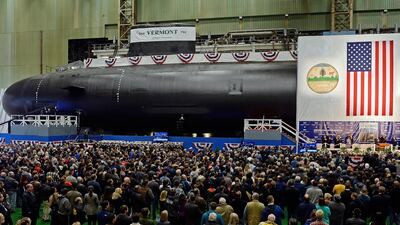A senior Russian official voiced concerns on Monday that Washington is increasing the role of nuclear weapons in its military planning as part of a stepped-up campaign by the Trump administration to ensure "U.S. military superiority over the rest of the world".
Andrei Belousov, deputy director of the Foreign Ministry's Department of Nonproliferation and Arms Control, told the UN General Assembly's disarmament committee that Russia is "especially concerned" at the Trump administration's Nuclear Posture Review. Mr Belousov also denied US allegations that Moscow had violated an arms treaty.
The policy review, released in early February, provides for "the creation of low-yield nuclear weapons that would lower the threshold of he use of nuclear weapons", Mr Belousov said. He said it "also envisages a return to the concept of a "limited nuclear war".
"In essence, the US military thinking in [the] nuclear field has rolled back a half a century when it was believed that a nuclear war was admissible and could be won," he told the committee's session on nuclear weapons.
Mr Belousov said Russia has repeatedly called for "appropriate conditions that would allow us to take practical measures to free the world from nuclear weapons". But he said Moscow must take into account "the existing strategic realities".
In addition to beefing up its nuclear arsenal, Mr Belousov said, the US is developing a global ballistic missile defence.
_________
Read more:
Trump says US will pull out of intermediate range nuclear deal
Donald Trump makes 'major mistake' in announcing withdrawal from arms control treaty
Russia and Egypt grow closer as Kremlin asserts regional influence
_________
He said the Trump administration is also refusing to abandon the potential use of weapons in outer space, increasing the "numeric and qualitative" imbalance in conventional weapons, and developing "the Prompt Global Strike concept" that would allow US precision-guided conventional weapons to strike anywhere on Earth within one hour.
Mr Belousov said the Trump administration explains its plans for "large-scale strengthening of its nuclear potential" by referring to the alleged growing role of nuclear weapons in Russia's military doctrine.
"Nevertheless, neither the military doctrine nor the statements of political or military leadership of the Russian Federation contain such assumptions," Mr Belousov said. "Actually, we reduced the role of nuclear weapons to the historic minimum."
He called US accusations that Russia is not complying with a 1987 nuclear weapons treaty "groundless" and said Moscow's claims of US violations of the Intermediate-Range Nuclear Forces Treaty are "justified".
Still, Mr Belousov said, "we are prepared to work together with our US colleagues on the entire set of problems regarding the INF. We hope that we will be reciprocated".
Donald Trump announced on Saturday that the US is withdrawing from the INF, which was signed with the former Soviet Union. He said Russia has violated the treaty, which prohibits the US and Russia from possessing, producing or test-flying ground-launched nuclear cruise and ballistic missiles with a range of 500 to 5,500 kilometres.
Mr Trump warned that the US will begin developing such weapons unless Russia and China agree not to possess or develop them. China was not a party to the agreement that was signed in 1987 by US President Ronald Reagan and Soviet leader Mikhail Gorbachev.
Mr Belousov said US withdrawal from the INF would be "another short-sighted and extremely dangerous step by the United States for international peace".
"The withdrawal from the treaty would prove again that the US political and military authorities prioritise their foreign policy goals by obsessively striving to ensure the US military superiority over the rest of the world," Mr Belousov said. "But it is clear that they are not concerned about such issues as strategic stability, international peace and global security at all."
US National Security Adviser John Bolton and his Russian counterpart, Security Council chairman Nikolai Patrushev, discussed a range of arms control issues in Moscow on Monday, including the INF and a possible five-year extension of another pivotal arms control agreement between Russia and the US – the New Start Treaty, according to a statement from the Russian council.
The New Start Treaty, which limits long-range nuclear weapons to 1,550 strategic nuclear warheads and 700 launchers, is scheduled to expire in 2021. Russia has questioned US compliance.
Mr Belousov said Russian President Vladimir Putin "has confirmed our principled readiness to study the possibility of the treaty's extension. However, it cannot be done without addressing the remaining questions regarding the US compliance".

